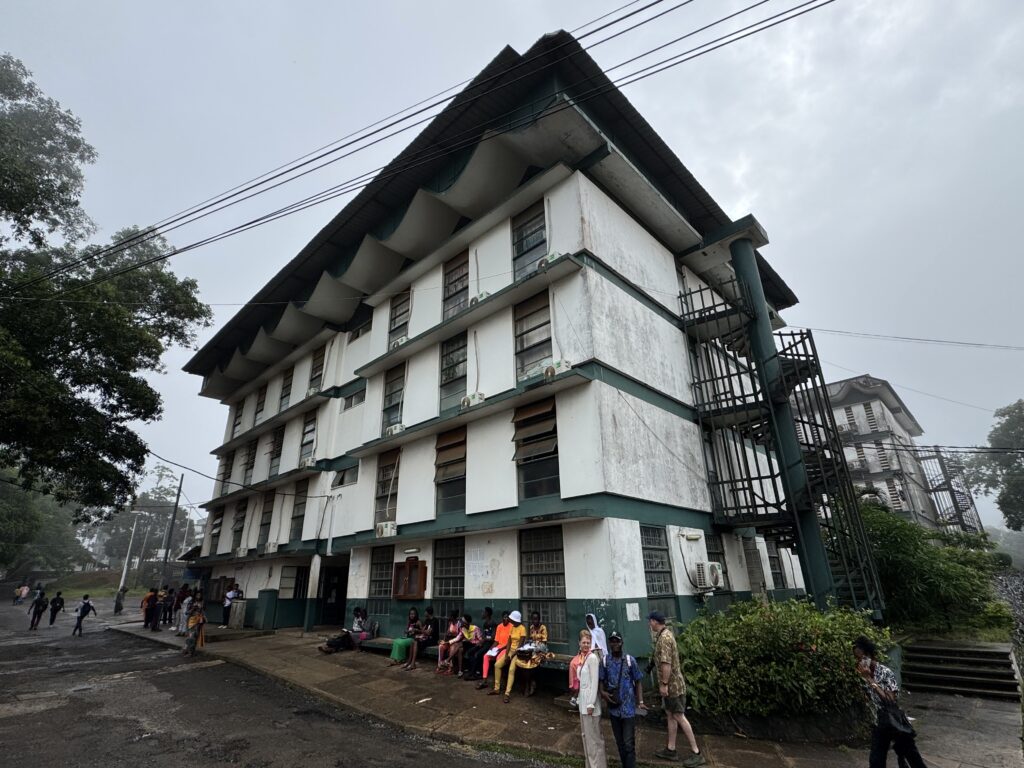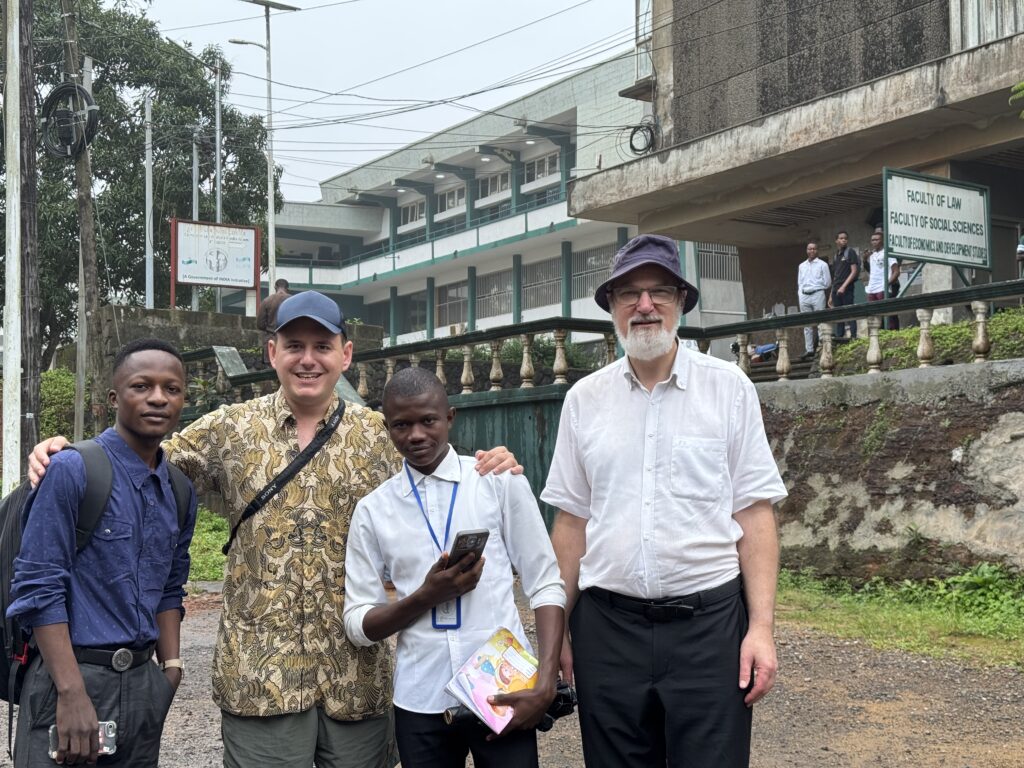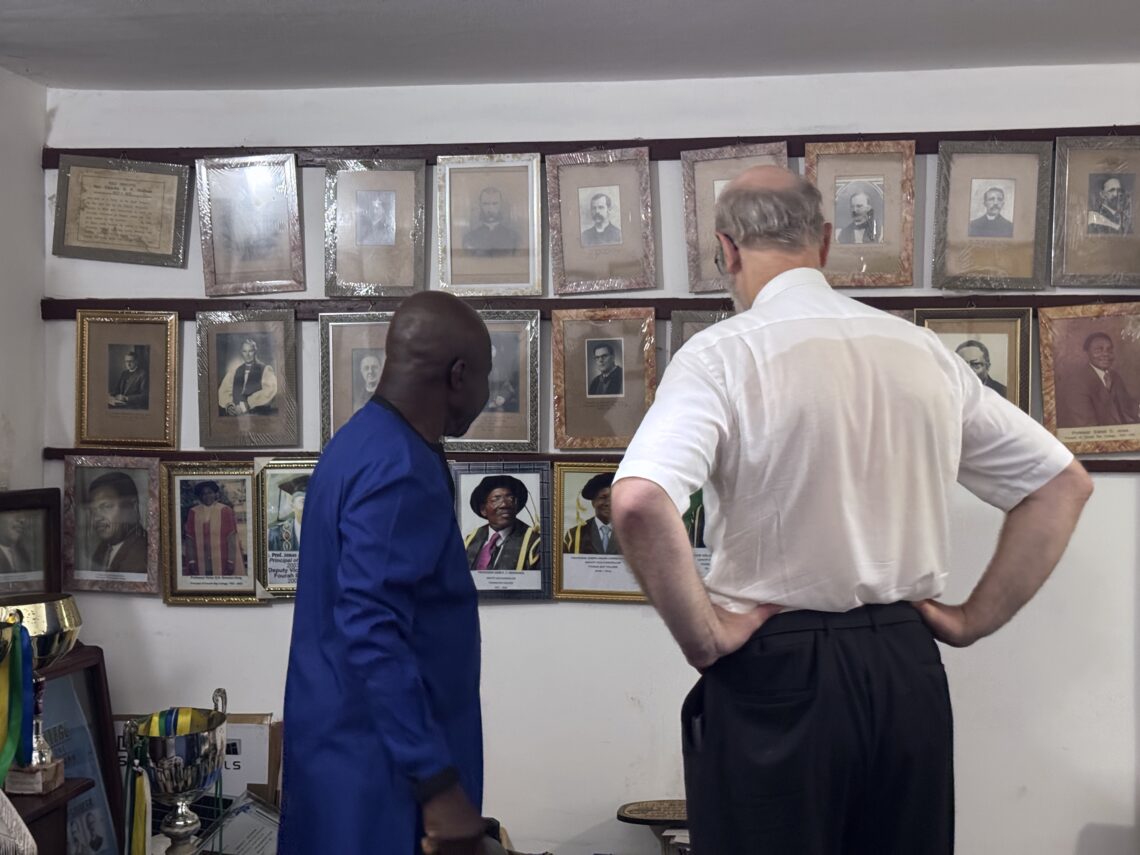(Bonn, 06.08.2025) Professor Thomas Paul Schirrmacher visited Fourah Bay College in Freetown (Sierra Leone) as well as its current head, Professor Kelleh Gbawuru Mansaray. He has been Vice Chancellor since 2022 – there is currently no Chancellor. Mansaray, who studied in Germany, showed Schirrmacher the gallery of college heads since 1827, illustrating the great influence German and Swiss scientists had. Schirrmacher and his team then visited several buildings of the college’s faculties, which today form the centre of the University of Sierra Leone.
Fourah Bay College in Freetown is also known as the ‘Athens of West Africa’ because it was the most important centre for higher education and intellectual life in the 19th and early 20th centuries and was the only institution of higher education of its kind in West Africa until the Second World War. It is also referred to as the ‘Oxford of West Africa’ because it has produced many prominent scientists and top politicians in West Africa. Many of the first African academics, clergy, teachers and later political leaders emerged from the college. It was the first Western higher education institution south of the Sahara and played a key role in shaping the development of an educated elite that went on to play decisive roles in administration, education, the church and politics in various West African countries.

Fourah Bay College was founded in 1827 by the British Church Missionary Society (CMS). The aim of the institution was to train African clergy and teachers for Christian missionary work. The first rector, Reverend Edward Jones, was an African-American missionary who had a decisive influence on the development of the college. With the admission of its first students – among them Samuel Ajayi Crowther, who later became the first Anglican bishop of Africa – the college began to develop into an important educational centre for West Africa. The college was then run for a long time by German and German-speaking missionaries and linguists. German linguists Sigismund W. Koelle and Charles (Carl) A. Reichardt in particular ensured that the college became a leader in taking African history and contextualisation seriously.
Although the college was founded by the British and has cooperated with the British University of Durham from early on and continues to do so today, it was also under the direction of German linguists and cultural researchers for many years, and its unusually broad combination of academic traditions has shaped the entire educational landscape of Sierra Leone. In the second half of the 19th century, Fourah Bay College developed from a purely missionary school into a fully-fledged college offering not only theology but also philosophy, languages and natural sciences. In 1876, the college became the first West African college to be affiliated with Durham University in England, enabling graduates to obtain a globally recognised degree. The college’s reputation spread quickly and students from all over West Africa came to Freetown.
Throughout the 20th century, Fourah Bay College was a central pillar of Sierra Leone’s education system. Over the decades, new faculties were established, creating a wide range of courses from engineering and law to social sciences and natural sciences. The college buildings on Mount Aureol in Freetown are architecturally and historically significant, and the university chapel commemorates the institution’s missionary heritage.
Fourah Bay College survived political upheaval, civil war and infrastructure problems in the 20th and early 21st centuries. Today, the college is the heart of the University of Sierra Leone and continues to shape the development of the country and the West African region.

Even before the college was founded, many German missionaries worked in the Church Missionary Society. They were known for their research on African linguistic diversity and were considered particularly committed and educated. The very first director of the predecessor institution, the Christian Institution, was the German Leopold Butscher, a Lutheran clergyman. He organised the school, oversaw its construction and opened it in 1816. Butscher was the first of a long line of German (and Swiss) missionaries who played a key role in shaping teaching and administration. Many of the early German-speaking lecturers conducted intensive research into local African languages. They helped make Fourah Bay College an early centre for African language studies. The strong presence of German teachers and academics in the early days was due, among other things, to the fact that British missionaries were more difficult to recruit and German theologians were often considered highly qualified and versatile.
Professor Kelleh Gbawuru Mansaray is one of the leading pioneers in the design and development of renewable energy programmes in Sierra Leone. He holds a BSc Degree in Physics from the University of Sierra Leone, MSc degree in Renewable Energy Technologies from Carl von Ossietzky University in Germany, a PhD degree in Biological Engineering (with specialization in Bioenergy Systems) from Dalhousie University in Canada and a one-year experience as a postdoctoral researcher in Chemical Engineering at the University of British Columbia in Canada among other qualifications. He has taught and conducted research in a range of renewable energy engineering related disciplines and supervised many undergraduate and postgraduate student projects which have resulted in prototypes and public installations especially in the areas of applied technology and renewable energy. In the area of project management, he served as the National Project Coordinator for the United Nations Industrial Development Organization in Sierra Leone with the responsibility of developing renewable energy projects and programmes, covering research, feasibility studies, technology transfer, implementation of turnkey projects, and capacity building. Prof. Mansaray has received several recognitions and awards at national and international levels including a recognition in the coveted global 2023 AD Scientific Index for his passionate contribution to the furtherance of academia, recipient of a University of Sierra Leone award in recognition of his contribution to research, a United Nations award in recognition of his special contribution to the South-South and Triangular Cooperation and a meritorious candidate of the Natural Sciences and Engineering Research Council of Canada. He is a member of the International Association for Solar Energy Education, a member of the Professional Engineers Registration Council of Sierra Leone and a Fellow of the Sierra Leone Institution of Engineers.
Downloads and Links
- Photo 1: Professor Mansaray explains to Thomas Schirrmacher the history of the Fourah Bay College Freetown Sierra Leone following the photos of his predecessors © Martin Warnecke
- Photo 2: The headquarters of the Fourah Bay College Freetown Sierra Leone © Thomas Schirrmacher
- Photo 3: Thomas Schirrmacher and Martin Warnecke with studenst from the Faculty of Law of the Fourah Bay College Freetown Sierra Leone © Thomas Schirrmacher
- Photo gallery of the visit: https://thomasschirrmacher.net/?p=24150
- The history of the Fourah Bay College: https://aaas.ecu.edu/sersas/wp-content/pv-uploads/sites/393/2021/05/The-Athens-of-West-Africa-International-Education-at-Fourah-Bay-College-1814-2002.pdf and https://www.thepatrioticvanguard.com/what-sierra-leoneans-did-not-know-about-fourah-bay-college
- Wikipedia entry on the University of Sierra Leone: https://en.wikipedia.org/wiki/University_of_Sierra_Leone
- Wikipedia entry in the Fourah Bay College: https://en.wikipedia.org/wiki/Fourah_Bay_College
- LinkedIn-Profile of Professor Mansaray: https://www.linkedin.com/in/kelleh-mansaray-1a476810b/


